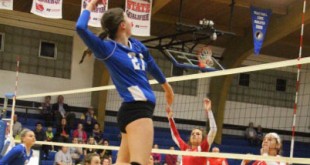The HSI style guide will continually develop as questions arise.
abbreviations Write out long organization titles on first reference with the initials following. For example, “The Nebraska School Activities Association (NSAA) announced…” and then “The NSAA…”
addresses Write out and capitalize “Street,” “Road,” “Boulevard,” etc. when used as part of a address without a street number. Abbreviate and capitalize “St.,” “Rd.,” “Blvd.,” etc. when a street number is used, e.g. “1600 Pennsylvania Ave.”
- Spell out and capitalize First through Ninth when used as street names. Never spell out street numbers, e.g. “5 Ninth St.”
alright This is an exception to the AP Stylebook.
a.m., p.m.
book titles Put in quotation marks. Capitalize principle words. Capitalize “small words,” i.e. “the,” “a” or “an” if it is the first of last word in the title. Examples: “Gone With the Wind” and “Of Mice and Men.”
boy, girl Acceptable for all high school students even if 18 years or older.
boyfriend, girlfriend
centuries 20th century, 21st century, etc. This is the only time that “th,” “st,” etc. is acceptable. Do not capitalize “century,” unless it is a proper name, such as “21st Century Fox.”
cities The following city names can stand alone without state identification: Atlanta, Baltimore, Boston, Chicago, Cincinnati, Cleveland, Dallas, Denver, Detroit, Honolulu, Houston, Indianapolis, Las Vegas, Los Angeles, Miami, Milwaukee, Minneapolis, New Orleans, New York, Oklahoma City, Philadelphia, Phoenix, Pittsburgh, St. Louis, Salt Lake City, San Antonio, San Diego, San Francisco, Seattle. All other cities should be followed with proper state identification — see states. Note: Because stories run online, use necessary state identifications even if it is in your own state.
college, university Capitalize as parts of a proper name, e.g. The University of Nebraska-Lincoln. Lowercase when standing alone, e.g. “She hopes to go to college.”
courtesy titles Do not use courtesy titles (i.e. Mr., Mrs. or Dr.) unless in a direct quotation.
days of the week Do not abbreviate.
decades Use an apostrophe if just using the past two numbers, e.g. “the ‘90s.” Do not use an apostrophe to show plural, e.g. “She started tennis in the 1970s” is correct.
dollars Use figures and the $ sign, e.g. “The University of Nebraska offered a $10,000 scholarship.”
email No hyphen.
Fahrenheit Spell out the first time, e.g. “Even though it was 100 degrees Fahrenheit…” Do not use on second reference.
figures Spell out numbers zero through nine. Use figures for numbers 10 and higher.
height Use figures, but spell out feet and inches. Hyphenate when used as an adjective before a noun, e.g. “The 6-foot-5-inch basketball player” or “The basketball player is 6 feet and 5 inches tall.”
holidays Capitalize names of federal holidays, e.g. “School was canceled on Columbus Day, but the football team still practiced.”
hometown
identifications
- For students, use full name, year in school, high school and city/state on first reference, e.g. “Samantha Smith, a junior from Lincoln Southeast High School in Lincoln, Neb., says…” On second reference, use his/her last name.
- For coaches, administrators, etc. avoid using titles before their names. For example, “Coach Bill Williams from the boys basketball team” is wrong. “Bill Williams, the boys basketball coach, says…” On second reference, use his/her last name.
Internet
Islam Followers of the Islam religion are Muslims. Adjective for Islam is Islamic.
magazine names Capitalize the first letters of the words, but do not place in quotation marks and do not italicize.
mascots On first reference, use the full title, e.g. “The Missouri Tigers.” On later references, the capitalized mascot name is acceptable. Official mascot names should be capitalized when used to describe a specific team, e.g. “The Tigers are off to a great start.” However, only use mascot names when referring to a team or competitive club. For example, “All of the Lions from Lincoln High School” is wrong.
midnight, noon Do not use 12 in front.
months Spell out all month names when they stand alone. Abbreviate only Jan., Feb., Aug., Sept., Oct., Nov. and Dec. when used with a day, e.g. “Her birthday is Nov. 14.” Use a comma between the date and year, e.g. “The team last won the championship on March 8, 2008.”
nicknames Use quotation marks when inserting a nickname into a person’s identification, e.g. Sen. Henry M. “Scoop” Jackson. Do not presume that a person wants his/her nickname used — ask to make sure!
numerals Spell out numerals at the beginning of a sentence, e.g. “Ten students showed up.” An exception: Don’t spell out years.
OK Not ok or okay.
percent One word spelled out, e.g. “She scored 98 percent on the test.”
Q&A For Q&A-style stories, format the question in bold and the answer in regular size.
quotation Do not alter quotations even to correct grammatical errors. Do not misrepresent the original context of the quotation.
race Avoid using references to race unless it is vital to a story.
recipes Abbreviate the following units of measurement: tsp., tbsp. Spell out cup. For temperatures, see Fahrenheit entry.
regions Capitalize geographical regions of the country, e.g. “She grew up in the Midwest” or “He goes to summer camp on the East Coast.”
seasons Lowercase winter, spring, summer and fall.
states Spell out state names when they stand alone. Abbreviate state names when used in conjunction with a city, e.g. “Lincoln, Neb.”
- Abbreviations: Ala. (Alabama), Ariz., Ark., Calif., Colo., Conn., Del., Fla., Ga., Ill., Ind., Kan., Ky., La., Md., Mass., Mich., Minn., Miss., Mo., Mont., Neb., Nev., N.H., N.J., N.M., N.Y., N.C., N.D., Okla., Ore., Pa., R.I., S.C., S.D., Tenn., Vt., Va., Wash., W. Va., Wis., Wyo.
- Note: Alaska, Hawaii, Idaho, Iowa, Maine, Ohio, Texas and Utah should never be abbreviated.
teams Use the singular verb and pronoun “it” when referring to the collective unit, e.g. “The team had its best season ever.” Use the plural verb with the team name, e.g. “The Kansas Jayhawks are among the best basketball teams in the country.”
teen, teenager (n.), teenage (adj.) Do not use teenaged.
telephone numbers Use figures.
television program titles See book titles.
time elements Be careful with “today,” “tonight,” “this morning,” etc. The day of the week is preferable.
time Use figures and colons, e.g. “The game begins at 1 p.m.” or “Practice is at 8:30 a.m.” Exceptions: noon and midnight.
personal titles Capitalize official titles that precede a name, e.g. “President Obama.” Lowercase official titles that stand alone or are written after the person’s name, e.g. “Barack Obama, who is president of the United States.” The following titles are abbreviated when used before a name: Dr., Gov., Lt. Gov., Rep. and Sen. For more information, see identifications.
try out (v.), tried out (past tense verb), tryout (n.)
TV Acceptable shortening of “television.”
United States, U.S.
versus Spell it out unless in a headline.
weights Use figures. See height.
years Use figures without commas for standalone years. This is the lone exception to the rule that figures should not be used to start a sentence, i.e. “1990 was the last year…” is acceptable. Use figures with a comma for full dates, e.g. “On Dec. 7, 1941, the Japanese military attacked Pearl Harbor.”
 High School Illustrated High School Sports Magazine
High School Illustrated High School Sports Magazine
